PRODUCTS
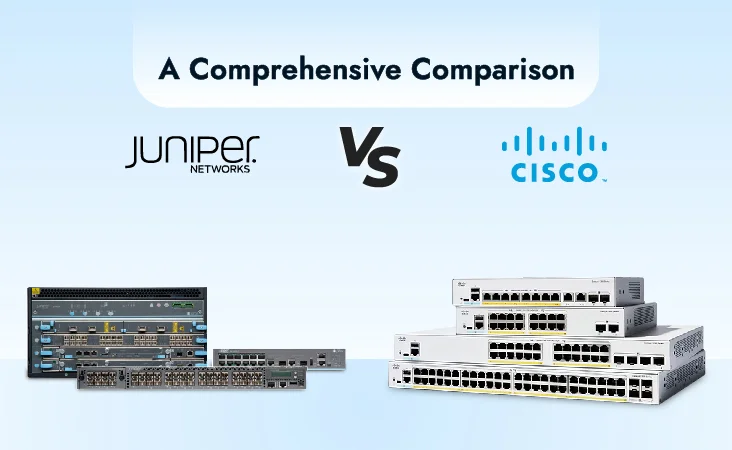 26
26The debate between Cisco and Juniper has raged in the field of networking for over a decade. As businesses look for the best systems for their operations, the choice between Cisco and Juniper becomes necessary. Both brands supply premium and core switches and routers available in fixed and modular setups. Many fundamental characteristics of Cisco and Juniper routers are common, but if you look closely and compare them, you will come across a few key differences. The decision between Cisco and Juniper routers becomes unclear as a result of these differences, and people are unable to find the correct fit for their needs. To assist you in making an informed choice, let's dive into a thorough comparison that considers the advantages and disadvantages of each.
Cisco is a global leader in the tech industry and stands at the forefront of technological innovation. Specializing in a range of products, Cisco switches have become the backbone of countless networks globally. One of its cool products is the Cisco 9300 switch, which is like a traffic director for your internet data, making sure it goes where it needs to. From small businesses to large enterprises, Cisco's influence is undeniable and super easy to use. It's like having a friend who always knows the best way to get things done in the world of the internet and networks.
Given Cisco's stronghold, Juniper Network has established itself as a respectable rival. Juniper Network is like a tech wizard for your computer connections, focusing on innovation and performance. Juniper is all about making your digital life easier and smarter, so you can do your thing without any tech headaches. Specializing in routers, switches, and security products, Juniper focuses on delivering reliable and scalable solutions to meet the evolving demands of modern networks.
One of the primary considerations when choosing between Cisco and Juniper is performance. Cisco's established reputation often precedes it, but Juniper has consistently proven its capabilities in handling high-performance networking tasks. To summarize in simple terms, the performance differences between Cisco and Juniper are listed in Table 1 below.
|
Performance Specification |
Cisco |
Juniper |
|
Throughput |
Up to XX Gbps |
Up to XX Gbps |
|
Routing Capacity |
Up to XX Mpps |
Up to XX Mpps |
|
Switching Capacity |
Up to XX Tbps |
Up to XX Tbps |
|
Latency |
X microseconds |
X microseconds |
|
Packet Buffer Size |
XX MB |
XX MB |
|
Number of Ports |
Varies by model |
Varies by model |
|
Ethernet Speeds |
1Gbps, 10Gbps, 25Gbps, 40Gbps, and 100Gbps |
1Gbps, 10Gbps, 25Gbps, 40Gbps, and 100Gbps |
|
Power Over Ethernet (PoE) |
Available on certain models |
Available on certain models |
|
Form Factors |
Rack-mountable, modular chassis |
Rack-mountable, modular chassis |
|
Redundancy Features |
Hot-swappable power supplies, fans, modules |
Hot-swappable power supplies, fans, and modules |
|
Security Features |
Advanced threat detection, VPN support, and firewall capabilities |
Intrusion Prevention System (IPS), VPN support, and firewall capabilities |
|
Management Interface |
Cisco IOS or Cisco NX-OS |
Junos OS |
|
Software Updates |
Cisco Smart Software Manager (CSSM) |
Juniper Advanced Insight Solutions (JAIS) |
|
Warranty and Support |
Standard warranty with options for extended support |
Standard warranty with options for extended support |
Cisco and Juniper both provide solutions to satisfy different client needs. Both Juniper and Cisco can be excellent options for companies of any size, depending on factors like cost, scalability, and security needs. In the networking space, Juniper Networks and Cisco are both significant players with broad product lines, affordable costs, and dependable customer support. Before making a choice, it's critical to evaluate the specific requirements of your business because every provider has distinct benefits that might be advantageous to certain consumers.
Table 2 summarizes the cost consideration differences between Cisco and Juniper data center switches.
|
Category |
Cisco Cost (USD) |
Juniper Cost (USD) |
Notes |
|
Routers |
|||
|
Entry-Level |
$2,000 - $10,000 |
$1,500 - $8,000 |
Prices depend on specific models and features. |
|
Mid-Range |
$10,000 - $50,000 |
$8,000 - $40,000 |
Cisco and Juniper offer a range of routers for medium-sized networks. |
|
High-End |
$50,000 and above |
$40,000 and above |
High-performance routers designed for large-scale enterprise networks. |
|
Switches |
|||
|
Access Layer |
$1,000 - $5,000 |
$800 - $4,000 |
Cost varies based on the number of ports, PoE capabilities, and advanced features. |
|
Distribution Layer |
$5,000 - $20,000 |
$4,000 - $15,000 |
Cisco and Juniper provide switches for distributing network traffic within the infrastructure. |
|
Core Layer |
$20,000 and above |
$15,000 and above |
High-capacity switches designed for the core of the network. |
|
Firewalls |
|||
|
Entry-Level |
$1,000 - $5,000 |
$800 - $4,000 |
Prices may vary based on throughput, security features, and scalability. |
|
Mid-Range |
$5,000 - $20,000 |
$4,000 - $15,000 |
Security appliances are suitable for medium-sized organizations. |
|
Enterprise |
$20,000 and above |
$15,000 and above |
High-performance firewalls for large enterprises with advanced security features. |
|
Wireless Access Points |
|||
|
Basic |
$200 - $800 |
$150 - $700 |
Prices depend on the wireless standard, range, and additional features. |
|
Enterprise |
$800 - $2,000 |
$700 - $1,800 |
High-capacity, feature-rich access points for large-scale deployments. |
|
Support and Maintenance |
|||
|
Annual Support |
20-30% of device cost |
15-25% of device cost |
Ongoing support costs to consider for software updates, technical assistance, and warranty coverage. |
Scalability is a key factor for businesses hoping for growth. Cisco's modular design of many of its switches allows for easy flexibility. Juniper data center switches, on the other hand, offer scalability through a software-driven approach, catering to dynamic network requirements. The scalability differences between Cisco and Juniper are mentioned below in Table 3.
|
Scalability Features |
Cisco |
Juniper |
|
Routing Scalability |
Cisco routers typically offer robust routing scalability, supporting a wide range of protocols and large routing tables. |
Juniper routers are known for their scalability in handling complex routing scenarios and large-scale networks. |
|
Switching Scalability |
Cisco network switches are designed for high port density and can scale to accommodate large enterprise networks. |
Juniper switches provide scalability for various network sizes and are suitable for both small and large deployments. |
|
Data Center Scalability |
Cisco's data center solutions, such as Nexus switches, are scalable to meet the demands of modern data center environments. |
Juniper's data center offerings, including QFX switches, are designed for scalability in virtualized and cloud environments. |
|
Security Scalability |
Cisco offers scalable security solutions, including firewalls and intrusion prevention systems, suitable for diverse network sizes. |
Juniper provides scalable security solutions with features like advanced threat prevention and unified threat management for various deployment scales. |
|
Software-Defined Networking (SDN) |
Cisco's SDN solution, Cisco ACI (Application Centric Infrastructure), offers scalability in managing and automating network resources. |
Juniper's SDN solution, Junos Fusion, provides scalability and flexibility in network programmability and automation. |
|
Cloud Scalability |
Cisco provides cloud solutions like Cisco CloudCenter that offer scalability in managing and orchestrating applications across multi-cloud environments. |
Juniper's Contrail Cloud offers scalability in building and managing private, public, and hybrid cloud infrastructures. |
|
Management Scalability |
Cisco provides scalable network management solutions, such as Cisco DNA Center, for efficiently managing large networks. |
Juniper's Network Director and Junos Space provide scalable management solutions for Juniper-based networks. |
|
Overall Scalability |
Cisco has a long-standing reputation for scalability and is widely used in large-scale enterprise and service provider networks. |
Juniper is recognized for its scalability, particularly in service provider networks and data center environments. |
Table 4 gives a list of different modular specifications between Cisco and Juniper.
|
Feature |
Cisco |
Juniper |
|
Operating System |
Cisco IOS (Internetwork Operating System) |
Junos |
|
Modular Architecture |
Based on the Cisco IOS Software Architecture |
Based on the Juniper Modular Operating System |
|
Routing Protocols |
Supports various routing protocols (OSPF, EIGRP, BGP, etc.) |
Strong support for OSPF, BGP, IS-IS, and more |
|
Hardware Platforms |
Wide range of routers and switches |
Offers a variety of routers and switches |
|
CLI (Command Line Interface) |
Cisco CLI (Command Line Interface) |
Junos CLI (Command Line Interface) |
|
Configuration Mode |
Executed in global configuration mode |
Uses a hierarchical configuration structure |
|
Configuration Commit |
Changes take effect immediately |
Requires a commit command to apply changes |
|
High Availability |
Supports High Availability (HSRP, VRRP, GLBP) |
Utilizes Virtual Chassis for redundancy |
|
Security Features |
Provides various security features (ACLs, VPNs, Firewalls) |
Emphasizes security with features like Unified Threat Management (UTM) |
|
Integration with Third-party Devices |
Compatible with third-party devices and technologies |
Tends to be more open and interoperable with third-party solutions |
|
QoS (Quality of Service) |
Offers robust QoS features for traffic prioritization |
Emphasizes CoS (Class of Service) for QoS |
|
Management Tools |
Cisco Prime, Cisco DNA Center |
Junos Space for network management |
|
Vendor-specific Technologies |
Supports technologies like Cisco TrustSec, Cisco StackWise, etc. |
Utilizes Juniper's proprietary technologies such as Junos Fusion, Virtual Chassis |
|
Training and Certification |
Cisco offers the Cisco Certified Network Associate (CCNA), Cisco Certified Network Professional (CCNP), and more |
Juniper offers certifications like Juniper Networks Certified Associate (JNCIA), Juniper Networks Certified Specialist (JNCIS), and others |
Cisco and Juniper routers can be broken into several different series that are designed for specific networking environments. Both companies supply superior and fast routers that are available in fixed and modular setups that support a variety of port configurations, speeds, and optics. Cisco and Juniper routers share certain basic features, but a comparison of the two models reveals some significant distinctions as well. See Table 5 below for the difference between Cisco routers and Juniper routers.
|
Feature |
Cisco Routers |
Juniper Routers |
|
Operating System |
IOS (Internetwork Operating System) |
Junos |
|
CLI |
Cisco CLI (Command Line Interface) |
Junos CLI |
|
Configuration Mode |
Global Configuration Mode, Interface Mode, etc. |
Operational Mode, Configuration Mode |
|
Routing Protocols |
EIGRP, OSPF, BGP, RIP, etc. |
OSPF, BGP, IS-IS, RIP, MPLS, etc. |
|
Modular Design |
Modular design with different modules for |
Modular design with separate functional |
|
routing, switching, and services. |
modules for routing, switching, and services. |
|
|
Hardware Platforms |
Wide range of routers for various |
MX Series, PTX Series, ACX Series, etc. |
|
applications and scalability. |
||
|
High Availability |
HSRP, VRRP, GLBP, etc. for redundancy. |
VRRP, NSR, Graceful Restart, etc. |
|
Security Features |
ACLs, Firewall, VPN, etc. |
ACLs, Stateful Firewall, IPsec VPN, etc. |
|
Integration |
Seamless integration with other Cisco |
Seamless integration with other Juniper |
|
products like switches and firewalls. |
products like switches and firewalls. |
|
|
Community Support |
Large and active community support. |
Strong community support with forums and |
|
Extensive documentation. |
resources. |
Cisco switches are well-known for their advanced technology and high performance. These devices are the core centers for many networks, ensuring flawless data transfer and connectivity. With various models catering to different needs, Cisco network switches offer scalability. However, the Juniper data center switches offer flexibility and are compatible with several other optical transceiver form factors, but they cannot be used with CPAK hardware. You can learn about the differences between these switches in Table 6 down below.
|
Feature |
Cisco Switches |
Juniper Switches |
|
Operating System |
Cisco IOS (Internetwork Operating System) |
Junos (Juniper Operating System) |
|
CLI (Command Line Interface) |
Cisco CLI (Command Line Interface) |
Juniper CLI (Command Line Interface) |
|
Configuration Mode |
Global Configuration Mode |
Configuration Mode |
|
VLAN Configuration |
vlan <vlan-id> |
set vlans vlan-name vlan-id vlan-id-list |
|
Link Aggregation |
EtherChannel (LACP or PAgP) |
LAG (Link Aggregation Group) with LACP or Static LAG |
|
Spanning Tree Protocol |
PVST+ (Per-VLAN Spanning Tree Plus) or Rapid PVST+ |
RSTP (Rapid Spanning Tree Protocol) |
|
Routing Protocols |
Supports various routing protocols like OSPF, EIGRP, BGP |
Native support for OSPF, BGP, IS-IS, RIP |
|
Virtual Routing and Forwarding (VRF) |
Supports VRF Lite and MPLS VPN |
Built-in support for VRF and MPLS |
|
Multicast Routing |
PIM (Protocol Independent Multicast) |
PIM (Protocol Independent Multicast) |
|
Security Features |
ACLs (Access Control Lists), Port Security, DHCP Snooping |
ACLs, Port Security, DHCP Snooping, DAI (Dynamic ARP Inspection) |
|
Quality of Service (QoS) |
Class-Based Weighted Fair Queuing (CBWFQ), Modular QoS CLI (MQC) |
Hierarchical CoS (Class of Service) configuration |
|
Power over Ethernet (PoE) |
Supported on some models with PoE capabilities |
Available on selected models with PoE capabilities |
|
Stacking Technology |
Cisco StackWise, Virtual Switching System (VSS) |
Virtual Chassis, Virtual Chassis Fabric |
|
Management Interfaces |
CLI, SNMP, HTTP/HTTPS, Telnet, and SSH |
CLI, SNMP, HTTP/HTTPS, Telnet, and SSH |
|
Hardware Redundancy |
Supports options like Hot Standby Router Protocol (HSRP) |
Virtual Chassis for redundancy |
|
Model Naming Convention |
Catalyst Series (e.g., Catalyst 2960, Catalyst 9300) |
EX Series (e.g., EX2300, EX4300), QFX Series |
Table 7 gives a brief overview of some of the popular switch models from Cisco and Juniper Networks.
|
Category |
Cisco Switch Models |
Juniper Switch Models |
|
Entry Level |
Cisco Catalyst 2960 Series |
Juniper EX2200 Series |
|
Mid-Range |
Cisco Catalyst 3650 Series |
Juniper EX3400 Series |
|
High-End (Enterprise) |
Cisco Catalyst 9300 Series |
Juniper EX4650 Series |
|
Data Center Aggregation |
Cisco Nexus 9000 Series (e.g., 9500) |
Juniper QFX5100 Series |
|
Data Center Leaf/Top of Rack |
Cisco Nexus 3000 Series |
Juniper QFX5200 Series |
|
Cloud Networking |
Cisco Nexus 7000 Series |
Juniper QFX10000 Series |
|
Modular (Chassis-based) |
Cisco Catalyst 6800 Series (e.g., 6880-X) |
Juniper QFX3000 Series |
|
Compact/Core Routing |
Cisco Catalyst 9300 Series (with Network Essentials License) |
Juniper EX9200 Series |
|
Power over Ethernet (PoE) |
Cisco Catalyst 3650 Series |
Juniper EX2300 Series |
|
Multigigabit Ethernet |
Cisco Catalyst 3850 Series |
Juniper EX4300 Series |
Choosing between JUNOS or IOS is like deciding which brain is the best for your network gadgets. Juniper Network's JUNOS operating system focuses on being stable and secure. It's like having a brain that fits many devices and always works well. Then there is Cisco's IOS, which is popular because it is easy to use. It's like having a brain that talks to your gadgets in a simple way, making it easier for the tech folks. So, do you want stability and adaptability with JUNOS or simplicity and ease with IOS? It's like picking the superhero for your network—the one who makes your digital life work better!
The Juniper vs. Cisco debate can be difficult to resolve. Cisco has a diverse technology portfolio and offers simplified networking solutions for modern technological infrastructures. Juniper Networks, on the other hand, provides products and services tailored to specific customer needs, and its customer service team prioritizes satisfaction. When deciding between Cisco and Juniper, it all comes down to your individual requirements. Businesses should evaluate their budget constraints and performance requirements before making a decision.
The decision between new and refurbished switches depends on various factors. While new switches guarantee the latest technology, refurbished options can offer significant cost savings without compromising on performance.
When it comes to buying Cisco switches, options abound. Authorized dealers, online retailers, and direct purchases from Cisco are all viable routes. Each has its advantages and considerations, and the choice depends on factors like budget, support, and warranty. You can buy Cisco 9300 switch at an affordable price.
Similarly, Juniper switches are available through various channels. Understanding the reputation of the seller, warranty terms, and customer support are crucial aspects when exploring purchase options for Juniper network switches.
Visit ORM Systems to purchase both Cisco and Juniper networking products, including routers, data center switches, and more, at a discounted and affordable price.
In the Cisco vs. Juniper debate, there is no one-size-fits-all answer. The choice between Cisco and Juniper depends on various factors, including the specific needs of the business, budget constraints, and future scalability requirements. Whether you're thinking of a brand-new Cisco switch or a more budget-friendly refurbished one, or considering Juniper, the important thing is to pick what fits your needs and your budget. It's all about making sure your tech tools match your ship for smooth sailing in the digital sea.
Related Topics:
Managed vs Unmanaged Switches: Cisco Catalyst 9200 Series
Cisco Catalyst 9600 vs Cisco Catalyst 6800 Series Switches: Upgrade to a Smarter Network
Cisco Nexus Vs Catalyst Switches: What’s the Difference?
Migration Guide: Cisco Catalyst 2960-X Series to 9200 Series
Q: What factors should I consider when choosing between Cisco and Juniper?
A: When deciding between Cisco and Juniper, factors such as performance requirements, scalability needs, and user interface preferences play a crucial role. Assess your specific network needs before making a choice.
Q: Are refurbished switches a reliable option?
A: Refurbished switches can be a cost-effective solution without sacrificing performance. However, ensure that the refurbishment process is thorough and that the seller provides a warranty to guarantee reliability.
Q: Can I mix and match Cisco and Juniper switches in a network?
A: While it's technically possible, it's advisable to stick to one brand for better compatibility and streamlined management. Mixing brands may lead to configuration complexities and potential performance issues.
Q: Where can I find the best deals to buy Cisco Catalyst switches?
A: Authorized dealers, reputable online retailers, and direct purchases from Cisco often offer competitive prices. Consider factors like warranty, customer support, and additional services when looking for the best deals.
Q: Is it better to invest in new or refurbished Juniper switches?
A: The choice between new and refurbished Juniper switches depends on your budget and specific requirements. New switches guarantee the latest technology, while refurbished options can offer substantial cost savings with reliable performance.
Recent Posts
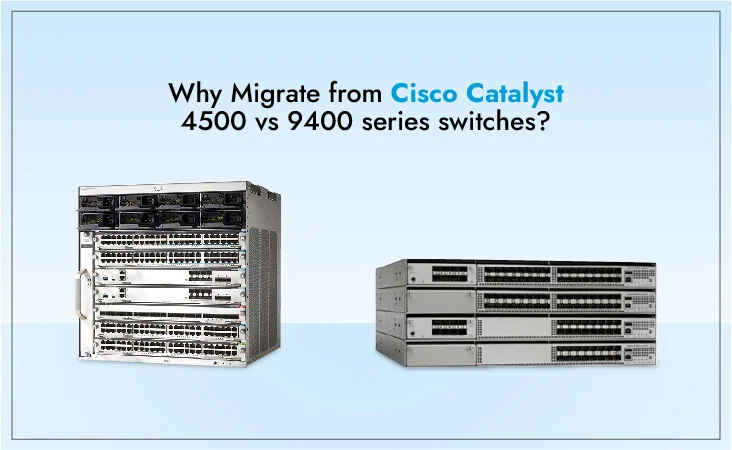
Why Migrate from Cisco 4500 switches to Cisco 9400 series switches?
7 May-2024
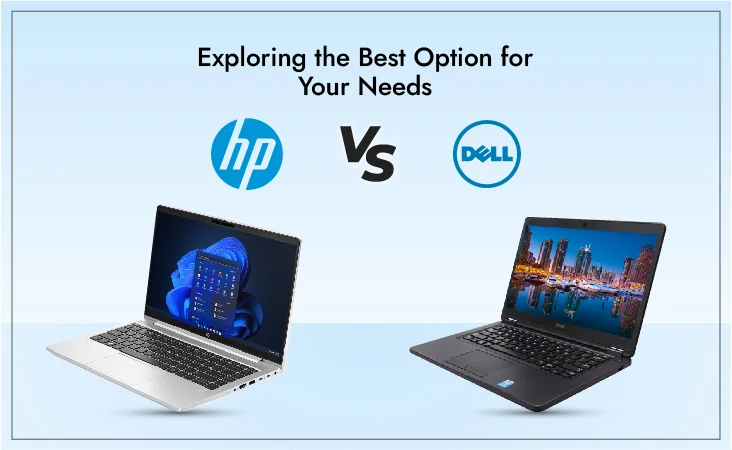
DELL vs HP: Exploring the Best Option for Your Needs
7 May-2024
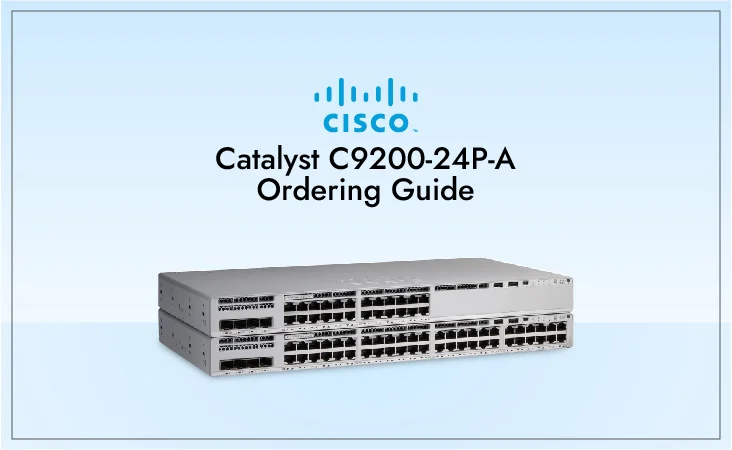
Cisco Catalyst C9200-24P-A Ordering Guide
6 May-2024
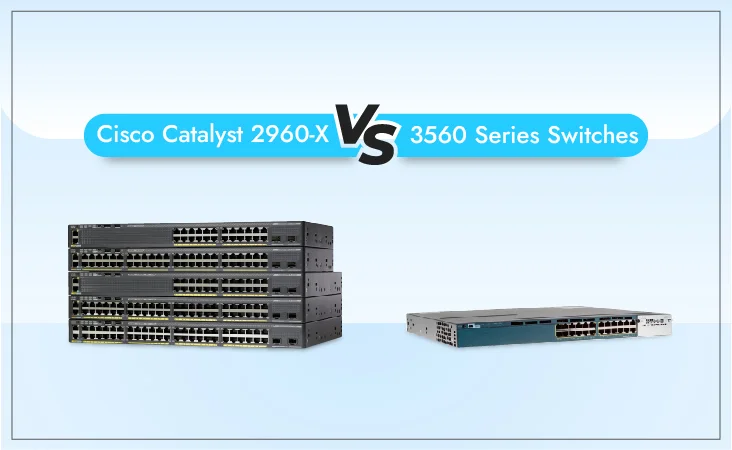
Cisco Catalyst 2960-X vs 3560 Series Switches
6 May-2024
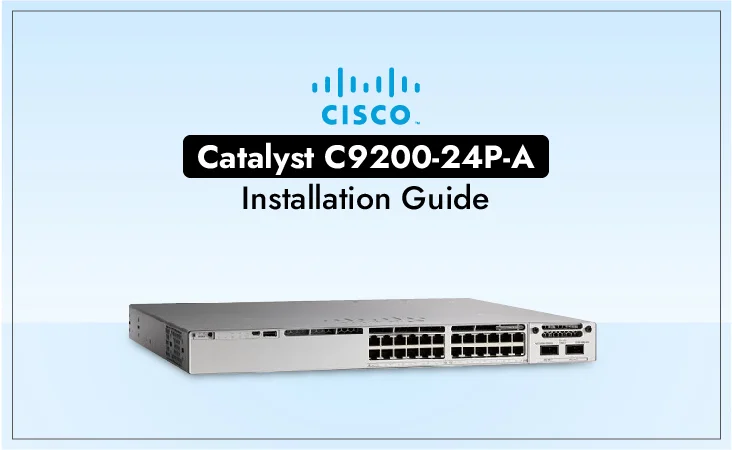
Cisco Catalyst C9200-24P-A Installation Guide
3 May-2024
Most Used Tags
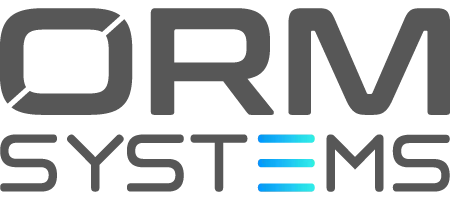
Developing performance-driven networks to boost the efficiency of your business

Thank you for your interest in ORM systems, our experts will connect with you shortly.



